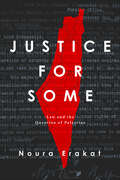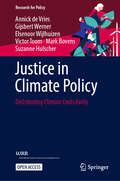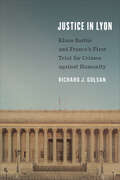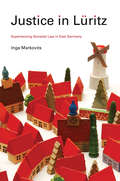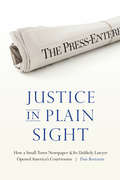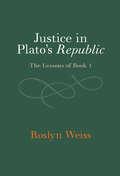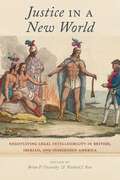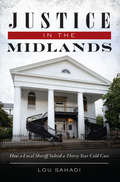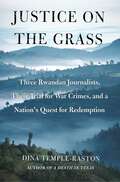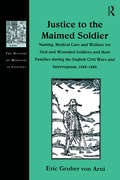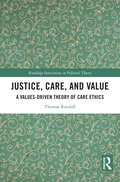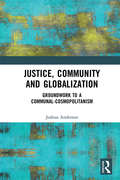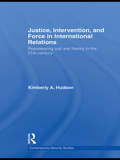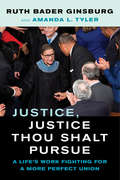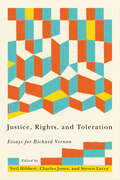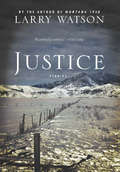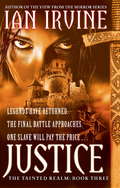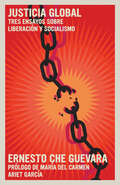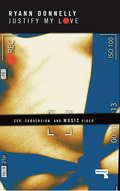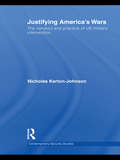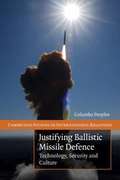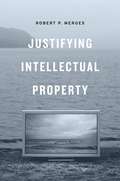- Table View
- List View
Justice for Some: Law and the Question of Palestine
by Noura ErakatJustice in the Question of Palestine is often framed as a question of law. Yet none of the Israel-Palestinian conflict's most vexing challenges have been resolved by judicial intervention. Occupation law has failed to stem Israel's settlement enterprise. Laws of war have permitted killing and destruction during Israel's military offensives in the Gaza Strip. The Oslo Accord's two-state solution is now dead letter. Justice for Some offers a new approach to understanding the Palestinian struggle for freedom, told through the power and control of international law. Focusing on key junctures—from the Balfour Declaration in 1917 to present-day wars in Gaza—Noura Erakat shows how the strategic deployment of law has shaped current conditions. Over the past century, the law has done more to advance Israel's interests than the Palestinians'. But, Erakat argues, this outcome was never inevitable. Law is politics, and its meaning and application depend on the political intervention of states and people alike. Within the law, change is possible. International law can serve the cause of freedom when it is mobilized in support of a political movement. Presenting the promise and risk of international law, Justice for Some calls for renewed action and attention to the Question of Palestine.
Justice in Asia and the Pacific Region, 1945-1952
by Yuma TotaniThis book explores a cross section of war crimes trials that the Allied powers held against the Japanese in the aftermath of World War II. More than 2,240 trials against some 5,700 suspected war criminals were carried out at 51 separate locations across the Asia Pacific region. This book analyzes fourteen high-profile American, Australian, British, and Philippine trials, including the two subsequent proceedings at Tokyo and the Yamashita trial. By delving into a large body of hitherto underutilized oral and documentary history of the war as contained in the trial records, Yuma Totani illuminates diverse firsthand accounts of the war that were offered by former Japanese and Allied combatants, prisoners of war, and the civilian population. Furthermore, the author makes a systematic inquiry into select trials to shed light on a highly complex - and at times contradictory - legal and jurisprudential legacy of Allied war crimes prosecutions.
Justice in Climate Policy: Distributing Climate Costs Fairly (Research for Policy)
by Mark Bovens Victor Toom Annick de Vries Gijsbert Werner Elsenoor Wijlhuizen Suzanne HulscherThis open access book is looking into ways to achieve just climate policy within a country. The authors of this monograph share a unique, timely and original vision: continuous support for climate policy is more likely to emerge when citizens find that the distribution of the bill for climate costs is fair. But what is a fair distribution of climate costs? This is an important question because financial costs of mitigation (reducing greenhouse gases), adaptation (adapting to climate change) and damage (compensating or compensating after weather extremes) increase significantly in the coming decades. Drawing on philosophy and ethics, the authors propose ten principles for achieving just distributions of domestic climate costs. Examples of such principles are individual responsibility, the polluter pays, greatest utility and capacity to pay. Yet what a fair distribution is, depends on, for example, political preferences and the policy issue at hand. Empirical research on designing climate policies, however, shows that distributive principles are not part of the political, policy, and public discussions. The authors therefore argue that explicit attention to principles of just distribution at the start of a policy process contributes to support for climate policy. This book provides tools to professionals and students to achieve justice in climate policy.
Justice in Lyon: Klaus Barbie and France’s First Trial for Crimes against Humanity
by Richard J. GolsanThe trial of former SS lieutenant and Gestapo chief Klaus Barbie was France’s first trial for crimes against humanity. Known as the "Butcher of Lyon" during the Nazi occupation of that city from 1942 to 1944, Barbie tortured, deported, and murdered thousands of Jews and Resistance fighters. Following a lengthy investigation and the overcoming of numerous legal and other obstacles, the trial began in 1987 and attracted global attention. Justice in Lyon is the first comprehensive history of the Barbie trial, including the investigation leading up to it, the legal background to the case, and the hurdles the prosecution had to clear in order to bring Barbie to justice. Richard J. Golsan examines the strategies used by the defence, the prosecution, and the lawyers who represented Barbie’s many victims at the trial. The book draws from press coverage, articles, and books about Barbie and the trial published at the time, as well as recently released archival sources and the personal archives of lawyers at the trial. Making the case that, despite the views of its many critics, the Barbie trial was a success in legal, historical, and pedagogical terms, Justice in Lyon details how the trial has had a positive impact on French and international law governing crimes against humanity.
Justice in Lüritz: Experiencing Socialist Law in East Germany
by Inga MarkovitsAs a child, Inga Markovits dreamt of stealing and reading every letter contained in a mailbox at a busy intersection of her town in order to learn what life is all about. When, decades later, working as a legal historian, she tracked down the almost complete archive of a former East German trial court, she knew that she had finally found her mailbox. Combining her work in this extraordinary archive with interviews of former plaintiffs and defendants, judges and prosecutors, government and party functionaries, and Stasi collaborators, all in the little town she calls "Lüritz," Markovits has written a remarkable grassroots history of a legal system that set out with the utopian hopes of a few and ended in the anger and disappointment of the many. This is a story of ordinary men and women who experienced Socialist law firsthand--people who applied and used the law, trusted and resented it, manipulated and broke it, and feared and opposed it, but who all dealt with it in ways that help us understand what it meant to be a citizen in a twentieth-century Socialist state, what "Socialist justice" aimed to do, and how, in the end, it failed. Brimming with human stories of obedience and resistance, endurance and cunning, and cruelty and grief, Justice in Lüritz is ultimately a book about much more than the law, or Socialism, or East Germany.
Justice in Plain Sight: How a Small-Town Newspaper and Its Unlikely Lawyer Opened America's Courtrooms
by Dan BernsteinJustice in Plain Sight is the story of a hometown newspaper in Riverside, California, that set out to do its job: tell readers about shocking crimes in their own backyard. But when judges slammed the courtroom door on the public, including the press, it became impossible to tell the whole story. Pinning its hopes on business lawyer Jim Ward, whom Press-Enterprise editor Tim Hays had come to know and trust, the newspaper took two cases to the U.S. Supreme Court in the 1980s. Hays was convinced that the public—including the press—needed to have these rights and needed to bear witness to justice because healing in the aftermath of a horrible crime could not occur without community catharsis. The newspaper won both cases and established First Amendment rights that significantly broadened public access to the judicial system, including the right for the public to witness jury selection and preliminary hearings.Justice in Plain Sight is a unique story that, for the first time, details two improbable journeys to the Supreme Court in which the stakes were as high as they could possibly be (and still are): the public's trust in its own government.
Justice in Plato's Republic: The Lessons of Book 1
by Roslyn WeissIn Book 4 of Plato's Republic, Socrates introduces what is regarded by scholars as the Platonic account of justice, according to which it is essentially internal and self-regarding, a matter of relations among the parts of a city or soul. In this book, Roslyn Weiss contends that there is another notion of justice, as other-regarding and external, which is to be found in a series of conversations in Book 1 between Socrates and three successive interlocutors. Weiss considers the relationship between justice as conceived in Book 1 and Book 4, and carefully examines what can be learned from each of the arguments. Her close analysis of Book 1 brings to light what Socrates really believed about justice, and extracts and explores this Book's many insights concerning justice—at both the political and the personal level.
Justice in a New World: Negotiating Legal Intelligibility in British, Iberian, and Indigenous America (Religion and Social Transformation)
by Brian P Owensby Richard J RossA historical and legal examination of the conflict and interplay between settler and indigenous laws in the New WorldAs British and Iberian empires expanded across the New World, differing notions of justice and legality played out against one another as settlers and indigenous people sought to negotiate their relationship. In order for settlers and natives to learn from, maneuver, resist, or accommodate each other, they had to grasp something of each other's legal ideas and conceptions of justice.This ambitious volume advances our understanding of how natives and settlers in both the British and Iberian New World empires struggled to use the other’s ideas of law and justice as a political, strategic, and moral resource. In so doing, indigenous people and settlers alike changed their own practices of law and dialogue about justice. Europeans and natives appealed to imperfect understandings of their interlocutors’ notions of justice and advanced their own conceptions during workaday negotiations, disputes, and assertions of right. Settlers’ and indigenous peoples’ legal presuppositions shaped and sometimes misdirected their attempts to employ each other’s law. Natives and settlers construed and misconstrued each other's legal commitments while learning about them, never quite sure whether they were on solid ground. Chapters explore the problem of “legal intelligibility”: How and to what extent did settler law and its associated notions of justice became intelligible—tactically, technically and morally—to natives, and vice versa? To address this question, the volume offers a critical comparison between English and Iberian New World empires. Chapters probe such topics as treaty negotiations, land sales, and the corporate privileges of indigenous peoples. Ultimately, Justice in a New World offers both a deeper understanding of the transformation of notions of justice and law among settlers and indigenous people, and a dual comparative study of what it means for laws and moral codes to be legally intelligible.
Justice in the Midlands: How a Local Sheriff Solved a Thirty-Year Cold Case (True Crime)
by Lou SahadiThe murder of Ron "Little Red" Beasley is one of the most bizarre homicide cases in Midlands history. This mystery, with a background of macabre events and colorful characters, remained unsolved since 1967. Beasley's murder was originally ruled a suicide, but his family and his friend Herman Young refused to believe that. When Beasley's wife was convicted of murdering her second husband, they grew even more suspicious. Young went on to become sheriff of Fairfield County and made it his mission to find the truth. Join author Lou Sahadi as he details the gruesome details of a murder, two dramatic court trials and the untiring work of a lawman to find justice for his friend.
Justice on the Grass: Three Rwandan Journalists, Their Trial for War Crimes and a Nation's Quest for Redemption
by Dina Temple-RastonThe 1994 Rwandan genocide, in which more than 800,000 Tutsi and moderate Hutu were massacred in just 100 days, was an unparalleled modern-day slaughter. How does a nation pick up the pieces after the killing has stopped?In a gripping narrative that examines the power of the press and sheds light on how the media turned tens of thousands of ordinary Rwandans into murderers, award-winning author and journalist Dina Temple-Raston traces the rise and fall of three media executives -- Ferdinand Nahimana, Jean-Bosco Barayagwiza, and Hassan Ngeze. From crime to trial to verdict, Temple-Raston explores the many avenues of justice Rwanda pursued in the decade after the killing. Focusing on the media trial at the United Nations International Criminal Tribunal for Rwanda, she then drops down to the level of the hills, where ordinary Rwandans seek justice and retribution, and examines whether politics in the East African nation has set the stage for renewed violence. In the months leading up to the killing, two local media outlets, Radio Télévision Libre des Mille Collines (RTLM) and the tabloid newspaper Kangura, warned that a bloody confrontation was brewing. No one would be spared, they said. Observers said later that fearmongering from RTLM and Kangura played a key role in igniting the genocide, so much so that the three men behind the media outlets became the first journalists since Nuremberg to be tried in an international court for crimes against humanity. Drawing on extensive interviews with key players, Dina Temple-Raston brings to life a cast of remarkable characters: the egotistical newspaper editor Hassan Ngeze; hate radio cofounders, the intellectual Ferdinand Nahimana and the defiant legal scholar Jean-Bosco Barayagwiza; an American-led prosecution team wary of a guilty verdict that might bring a broadly written judgment muzzling the press the world over; the bombastic American defense attorney John Floyd; heroic Damien Nzabakira, who risked his life to drive forty orphans to safety only to spend eight years in prison accused of their murder; and Bonaventure Ubalijoro, a Rwandan diplomat and politician who believed in miracles. An extraordinary feat of reporting and narrative, Justice on the Grass reveals a Rwanda few have seen. A searing and compassionate book, Justice on the Grass illustrates how, more than a decade later, a country and its people are still struggling to heal, to forgive, and to make sense of something that defies credibility and humanity.
Justice to the Maimed Soldier: Nursing, Medical Care and Welfare for Sick and Wounded Soldiers and their Families during the English Civil Wars and Interregnum, 1642–1660 (The History of Medicine in Context)
by Eric Gruber ArniIn the popular imagination, the notion of military medicine prior to the twentieth century is dominated by images of brutal ignorance, superstition and indifference. In an age before the introduction of anaesthetics, antibiotics and the sterilisation of instruments, it is perhaps unsurprising that such a stereotyped view has developed, but to what degree is it correct? Whilst it is undoubtedly true that by modern standards, the medical care provided in previous centuries was crude and parochial, it would be wrong to think that serious attempts were not made by national bodies to provide care for those injured in the military conflicts of the past. In this ground breaking study, it is argued that both sides involved in the civil wars that ravaged the British Isles during the mid seventeenth century made concerted efforts to provide medical care for their sick and wounded troops. Through the use of extensive archival sources, Dr Gruber von Arni has pieced together the history of the welfare provided by both Parliamentarian and Royalist causes, and analyses the effectiveness of the systems they set up.
Justice, Care, and Value: A Values-Driven Theory of Care Ethics (Routledge Innovations in Political Theory)
by Thomas RandallIn Justice, Care, and Value Thomas Randall argues for the radical potential of care ethics as a distinct and preferable theory of distributive justice. Advancing the feminist literature, this book defends a vision of society that can best enable caring relations to flourish. Specifically, Randall proposes a values-driven theory of care ethics that derives normative criteria for evaluating the moral worth of caring relations and their surrounding institutions via a classification of the values of care. They argue that such a theory gives us unique and meaningful solutions to contemporary questions of distributive justice across personal, political, global, and intergenerational domains. In doing so, the book makes significant strides to engage care ethics with the broader moral and political philosophy literature. Topical and interdisciplinary, Randall demonstrates that care ethics has the conceptual resources to ground distributive theories of socialism, territorial and natural resource rights, obligations to future generations, and historic redress. The book will be of great interest to academics, researchers, and students of feminist philosophy, but also of liberalism, political economy, and theories of global and intergenerational justice.
Justice, Community and Globalization: Groundwork to a Communal-Cosmopolitanism
by Joshua AndersonThis book takes up the tension between globalization and community in order to articulate a new theory of global justice. Although the process of globalization is not new, its current manifestation and consequences are. At the same time, there is a growing recognition of the importance of community, identity and belonging. These two facts have generally been understood to be fundamentally in tension, both theoretically and descriptively. This book seeks to resolve this tension, and then draw out the implications for a theory of global justice and an understanding of the value and purpose of community. Importantly, the book argues, not only does an acceptance of the significance of the fact of globalization and the importance of community call for cosmopolitan duties and obligations, but it also calls into question the legitimacy and justification of the traditional nation-state. Aimed primarily at scholars working on issues related to political philosophy, globalization and global justice, the book will appeal to readers in law, politics, philosophy, and sociology.
Justice, Intervention, and Force in International Relations: Reassessing Just War Theory in the 21st Century (Contemporary Security Studies)
by Kimberly A. HudsonThis book analyses the problems of current just war theory, and offers a more stable justificatory framework for non-intervention in international relations. The primary purpose of just war theory is to provide a language and a framework by which decision makers and citizens can organize and articulate arguments about the justice of particular wars. Given that the majority of conflicts that threaten human security are now intra-state conflicts, just war theory is often called on to make judgments about wars of intervention. This book aims to critically examine the tenets of just war theory in light of these changes, and formulate a new theory of intervention and just cause. For Michael Walzer, the leading scholar of just war theory, armed humanitarian intervention is permissible only in cases of genocide, ethnic cleansing, widespread massacres, or enslavement. This book shows why this threshold is too restrictive in light of the progressive shift away from interstate conflict as well as the emerging norms of 'sovereignty as responsibility' and the 'responsibility to protect'. Justice, Intervention and Force in International Relations aims to establish a new, stable foundation for non-intervention and a revised threshold for 'just cause'. In addition, this book demonstrates that over-reliance on the just cause category distorts understanding, analysis, and public discussion of the justice or injustice of resorting to war. This new book will be of much interest to students of ethics, security studies, international relations and international law. Kimberley Hudson is Assistant Professor of Political Science at American International College, and has a Phd in International Relations from Brown University.
Justice, Justice Thou Shalt Pursue: A Life's Work Fighting for a More Perfect Union (Law in the Public Square #2)
by Ruth Bader GinsburgRuth Bader Ginsburg's last book is a curation of her own legacy, tracing the long history of her work for gender equality and a "more perfect Union." In the fall of 2019, Justice Ruth Bader Ginsburg visited the University of California, Berkeley School of Law to deliver the first annual Herma Hill Kay Memorial Lecture in honor of her friend, the late Herma Hill Kay, with whom Ginsburg had coauthored the very first casebook on sex-based discrimination in 1974. Justice, Justice Thou Shalt Pursue is the result of a period of collaboration between Ginsburg and Amanda L. Tyler, a Berkeley Law professor and former Ginsburg law clerk. During Justice Ginsburg's visit to Berkeley, she told her life story in conversation with Tyler. In this collection, the two bring together that conversation and other materials—many previously unpublished—that share details from Justice Ginsburg's family life and long career. These include notable briefs and oral arguments, some of Ginsburg's last speeches, and her favorite opinions that she wrote as a Supreme Court Justice (many in dissent), along with the statements that she read from the bench in those important cases. Each document was chosen by Ginsburg and Tyler to tell the story of the litigation strategy and optimistic vision that were at the heart of Ginsburg's unwavering commitment to the achievement of "a more perfect Union." In a decades-long career, Ruth Bader Ginsburg was an advocate and jurist for gender equality and for ensuring that the United States Constitution leaves no person behind. Her work transformed not just the American legal landscape, but American society more generally. Ginsburg labored tirelessly to promote a Constitution that is ever more inclusive and that allows every individual to achieve their full human potential. As revealed in these pages, in the area of gender rights, Ginsburg dismantled long-entrenched systems of discrimination based on outdated stereotypes by showing how such laws hold back both genders. And as also shown in the materials brought together here, Justice Ginsburg had a special ability to appreciate how the decisions of the high court impact the lived experiences of everyday Americans. The passing of Justice Ruth Bader Ginsburg in September 2020 as this book was heading into production was met with a public outpouring of grief. With her death, the country lost a hero and national treasure whose incredible life and legacy made the United States a more just society and one in which "We the People," for whom the Constitution is written, includes everyone.
Justice, Rights, and Toleration: Essays for Richard Vernon
by Neil Hibbert, Charles Jones, and Steven LecceThe political theory of Richard Vernon has been a guiding light for students of politics for over five decades. From the situated ethics of shared citizenship to the normative character of individuals’ connections to members of other societies and generations, Vernon has cleared a distinctive course in his contributions to the many complex dimensions of political morality.Justice, Rights, and Toleration centres on the core ideas that animate Vernon’s approcach to political theory. Contributors to this volume – all former students and colleagues of Vernon – offer critical engagement with the fundamental themes threaded throughout the thinker’s work on the perennial political challenges in liberal democratic societies, including the understanding of citizenship and political membership, justice within and between nations and generations, the rights of children and parents, and the idea of toleration. Vernon articulated a clear vision of the nature of these problems as well as a nuanced approach to addressing them, one rooted in the ideas of democratic dialogue and justice. The essays in this volume are a testament to the breadth of the pressing issues on which Vernon’s work continues to advance critical insights.Justice, Rights, and Toleration provides a worthy tribute to the wide range of Richard Vernon’s interests and the inspiration still to be found in his deep yet subtle body of work in political theory.
Justice: A Beginner's Guide (Beginner's Guides)
by Raymond WacksIn this highly topical introduction, Professor Raymond Wacks explains and evaluates the leading theories of justice that have shaped our societies and their legislative and judicial systems, and explores the extent to which fundamental notions like fairness, equality and freedom are reflected in contemporary society. By analysing some of the world&’s most pressing challenges, including terrorism, corruption and migration, Justice: A Beginner&’s Guide shows how these ideas are applied in practice – and how far we still have to go to achieve social justice.
Justice: Stories
by Larry WatsonThe author of Montana 1948 explores the early years of a powerful Western family in these “beautifully written” linked stories (USA Today).Larry Watson’s bestselling novel Montana 1948 was acclaimed as a “work of art,” a prize-winning evocation of a time, a place, and a family (San Francisco Chronicle). Justice is the stunning prequel that illuminates the Hayden clan’s early years, and the circumstances that led to the events of Montana 1948. With the precision of a master storyteller, Watson moves seamlessly through the decades and among the strong and hard-bitten characters that make up the Hayden family, and in the process opens an evocative window on the very heart of the American West.“An engrossing story of love, familial relationships, and secrets . . . re-creates the vivid beauty of Big Sky country.” —Booklist“Filled with rugged prose sometimes as biting as a northern plains wind.” —The Washington Post“Surprises and scenes of dramatic power punctuate the narrative . . . Throughout, Watson writes with ruthless honesty about his characters’ stunted dreams, unpredictable emotions and outbursts of senseless violence, showing once again that he understands not only the West but the untamed hearts that have roamed it.” —Publishers Weekly (starred review)
Justice: Tainted Realm: Book 3 (Tainted Realm #3)
by Ian IrvineTHE FINAL BATTLE - THE ULTIMATE PRICE The once beautiful land of Hightspall is being carved up by warring armies led by figures from out of legend. One army is headed by the charismatic brute, Axil Grandys, and the other by Lyf, resurrected sorcerer-king and Axil's ancient nemesis. Only the escaped slave Tali and her unreliable magic stand in their way - but Tali's gift grows more painful every time she uses it. As the armies converge on the fateful peak of Touchstone, Tali and her ally Rix must find a way to overcome Lyf and prevent Axil from using the Three Spells that will destroy Hightspall for ever.
Justicia Global: Tres ensayos sobre liberación y socialismo (The Che Guevara Library)
by Ernesto Che GuevaraA Spanish-language edition of three speeches on corporate globalism and imperialism by one of the most widely known guerilla fighters, political theorists, and organizers, Che Guevara.In this collection of three speeches, Ernesto Che Guevara offers a revolutionary view of a world in which human solidarity and understanding replace imperialist agression and exploitation. First, in a sharp speech given in Algeria on February 24, 1965 at the Afro-Asia Economic Seminar, Che speaks about the nature of capitalism and the revolutionary struggle that would open the way for a new, socialist society. Guevara's 1965 essay, "Socialism and Man in Cuba," is a milestone in twentieth-century emancipatory social thought. Finally, &“Message to the Tricontinental&” is one of Che&’s more well-known works, which outlines the tactics and strategies that should be followed in revolutionary struggle.This collection of writings merges Che's philosophy, politics, and economics in his all encompassing, coherent revolutionary vision. His ideas and his struggle strike a chord in the current search for global justice.¿Existe una alternativa a la globalización empresarial y al militarismo que asola nuestro planeta? Estas obras clásicas de Ernesto Che Guevara presentan una visión revolucionaria de un mundo diferente en el que la solidaridad humana y la comprensión sustituyen a la agresión y la explotación imperialistas.
Justify My Love: Sex, Subversion, and Music Video
by Ryann DonnellyAn analysis of sex and gender in music videos, covering everyone from Beyonce to Madonna, Nine Inch Nails to Mykki Blanco.In Justify My Love, Ryann Donnelly explores sex and gender in one of the most widely consumed art forms of our age -- the music video.Through an autobiographical reckoning with the author's life in a band and collaboration with past lovers, and a close analysis of the erotic iconography of music videos, Justify My Love tells the subversive history of this medium, from the inception of MTV in 1981 through to the 2010s.Covering everything from Lady Gaga and Beyonce to Nine Inch Nails and George Michael, Justify My Love shows how subversion became mainstream, and how marginalized voices shaped some of the biggest music videos of the last thirty years.
Justifying America's Wars: The Conduct and Practice of US Military Intervention (Contemporary Security Studies)
by Nicholas Kerton-JohnsonThis book examines the justifications for, and practice of, war by the US since 1990, and examines four case studies: the Gulf War, Kosovo, Afghanistan and Iraq. The author undertakes an examination of presidential speeches and public documents from this period to determine the focal points on which the respective presidents based their rhetoric for war. The work then examines the practice of war in the light of these justifications to determine whether changes in justifications correlate with changes in practice. In particular, the justificatory discourse finds four key themes that emerge in the presidential discourses, which are tracked across the case studies and point to the fundamental driving force in US motivations for going to war. The four key themes which emerge from the data are: international law or norms; human rights; national interest; and egoist morality (similar too, but wider than, 'exceptionalism'). This analysis shows that 9/11 resulted in a radical shift away from an international law and human rights-focused justificatory discourse, to one which was overwhelmingly dominated by egoist-morality justifications and national interest. This book will be of much interest to students of US foreign policy, humanitarian intervention, Security Studies, and IR theory.
Justifying Ballistic Missile Defence
by Columba PeoplesTechnology is championed as the solution to modern security problems, but also blamed as their cause. This book assesses the way in which these two views collide in the debate over ballistic missile defense: a complex, costly and controversial system intended to defend the United States from nuclear missile attacks. Columba Peoples shows how, in the face of strong scientific and strategic critique, advocates of missile defense seek to justify its development by reference to broader culturally embedded perceptions of the promises and perils of technological development. Unpacking the assumptions behind the justification of missile defense initiatives, both past and present, this book illustrates how common-sense understandings of technology are combined and used to legitimate this controversial and costly defense program. In doing so it engages fundamental debates over understandings of technological development, human agency and the relationship between technology and security.
Justifying Genocide: Germany and the Armenians from Bismark to Hitler
by Stefan IhrigAs Stefan Ihrig shows in this first comprehensive study, many Germans sympathized with the Ottomans' longstanding repression of the Armenians and with the Turks' program of extermination during World War I. In the Nazis' version of history, the Armenian Genocide was justifiable because it had made possible the astonishing rise of the New Turkey.
Justifying Intellectual Property
by Robert P. MergesWhy should a property interest exist in an intangible item? In recent years, arguments over intellectual property have often divided proponents—who emphasize the importance of providing incentives for producers of creative works— from skeptics who emphasize the need for free and open access to knowledge. In a wide-ranging and ambitious analysis, Robert P. Merges establishes a sophisticated rationale for the most vital form of modern property: IP rights. His insightful new book answers the many critics who contend that these rights are inefficient, unfair, and theoretically incoherent. But Merges’ vigorous defense of IP is also a call for appropriate legal constraints and boundaries: IP rights are real, but they come with real limits. Drawing on Kant, Locke, and Rawls as well as contemporary scholars, Merges crafts an original theory to explain why IP rights make sense as a reward for effort and as a way to encourage individuals to strive. He also provides a novel explanation of why awarding IP rights to creative people is fair for everyone else in society, by contributing to a just distribution of resources. Merges argues convincingly that IP rights are based on a solid ethical foundation, and—when subject to fair limits—these rights are an indispensable part of a well-functioning society.
